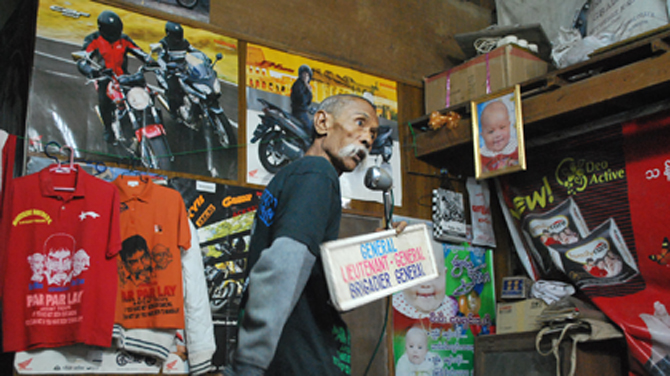MANDALAY—A visit to The Moustache Brothers is a rite of passage for any foreign journalist visiting Mandalay, Burma's second city and the former capital before the invading British deposed the country's last King, Thibaw, in 1885.
Lu Maw, the sole English speaker in the 60-something comedy trio, sits cross-legged on the floor in an upstairs room, chain-smoking cheroots and wise-cracking. A warm-up, it seems, for the Brothers' nightly performance, due to start in a couple of hours.
An environmental report running on the
Deutsche Welle news on a nearby TV sets him off. “You know Burma's government will save us all from global warming,” he says. “Thailand floods: global warming, Australia bushfire: global warming,” and the list goes on. “The UN has a meeting on global warming and say 'let's turn off all lights for one hour, one day a year.'”
Then the punchline: “But the Burma government makes sure there is no light 24/7, all year! They will solve global warming!” quips Lu Maw, referring to Burma's notorious electricity shortages despite the country having plenty of resources in the form of oil, gas and hydropower.
The vaudeville trio are renowned in Burma for their send-ups of the country's military rulers, an irreverence that landed two of them, Par Par Lay and Lu Zaw, in jail after a performance at pro-democracy icon Aung San Suu Kyi's house in Rangoon in 1996.
The interview, like the performance later that night, is full of veiled references and allusions to politics and society in Burma. Western countries and institutions do not escape, however, with Lu Maw hammering them over selective interventions in human rights-abusing countries around the world.
Handing out cheroots to the 13 foreigners sitting in the “theater”—a garage in a Mandalay side-street—Lu Maw guffaws, “NATO and the UN help Libya—they have oil. But in Burma, no one comes to help. Why not? We have resources too, we have opium!”
And Lu Maw himself gets it from Par Par Lay, who mocks his younger sibling for not being jailed. “Don't mind him,” says Lu Maw, cackling and showing a grasp of English slang. “He was in the clink, in the porridge.”
The anyeint (Burmese for vaudeville) trio are not the sole attraction in and around Mandalay. What is deemed the world's longest teak bridge crosses a lake near Amarapura—the royal capital before the move to Mandalay in 1859.
The 1,200-meter U Bein Bridge and Taungthaman Lake are a sight to behold at twilight, particularly in the brief period as the sun drops behind the horizon, leaving the water and sky to merge into an indistinguishable misty-grey behind the temples on the Mandalay city side, just before darkness envelops the scene.
Mandalay Hill overlooks the city, 230 meters and 1,729 steps high, up a covered stairwell between benches carved with donation-funded inscriptions for merit-seeking families, on a site said to have been visited by Gautama Buddha. Dozens of Burmese amble up the steps, some stopping for snacks on the way, others sitting with the handful of fortune-tellers making less than a fortune from reading palms on the hill.
Twenty-eight-year-old Kyaw Aung says, “I charge 1,000 kyat to read a palm.” This non-Buddhist practice at an otherwise Buddhist pilgrimage site serves as a reminder of the fondness of many Burmese for soothsayers and fortune-tellers.
Thanaka-pasted women sell souvenirs, some handcrafted from locally felled timber. I count six foreign tourists in the three hours spent on and around the hill, admittedly on a hot Sunday afternoon, and the curious stares from vendors and local pilgrims suggest that Mandalay does not receive so many Western visitors, despite the city being glossed widely in songs and literature—a metonymy for “exotic” travel.
That stems from Rudyard Kipling's “Mandalay”—although the British poet apparently never traveled as far as the old Burmese imperial capital.


